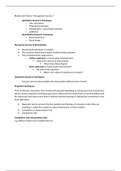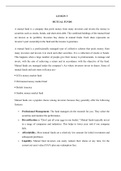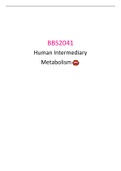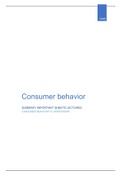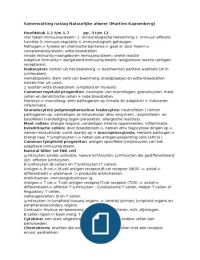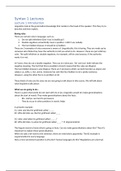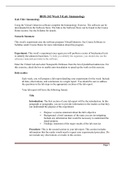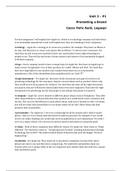fBrand and Product Management Lecture 7
- Qualitative Research Techniques
o Free association
o Projective techniques
o Ethnographic / experiential methods
o Laddering
- Quantitative Research Techniques
o Brand awareness
o Brand image
Measuring Sources of Brand Equity
Measuring brand equity is complex
The customer-based brand equity model provides guidance
Two (complementary approaches)
o Indirect approach to brand equity measurement
Look at the sources of brand equity
What drives Brand Equity?
o Direct approach to brand equity measurement
We look at the outcomes
What is the value of creating such a brand?
Qualitative Research Techniques
- Can give you very deep insights into how people really perceive a brand
Projective techniques
Most of the time consumers have trouble with actually identifying or voicing how they actually feel
about a brand. Projective techniques give them a kind of tool to voice these can of associations and
the ideas they have about some brand. Without directly knowing or making that connections in the
head right away.
Diagnostic tool to uncover the true opinions and feelings of consumers when they are
unwilling or otherwise unable to express themselves on these matters.
Completion or interpretation task
Comparison task
Completion and Interpretation task
e.g. Ballon/cartoon test or bubble exercise
, Ethnographic / Experiential Methods
Customers may not be able to fully express themselves Observe consumers in their natural
environment
In-home observations
Pictures
o Ask people to make pictures. E.g. L’Oréal case: think about hair care products, let
them make pictures of their bathroom, so you can see what environment it is be used
and you see other products and brands they use next to yours.
Hand-held camera
Laddering
Laddering is a way of measuring consumers’ means-end chains that make use of semi-structured
qualitative personal interviews.
Interviewing technique, which want to find out, without asking it directly but indirectly with
questions to answer the means-end value chain.
First physical attributes and you try to uncover the positive attributes of the product. You want to
uncover the emotions benefits a consumer achieves from the product.
In the end you want to reveal the value a product or brand has for a consumer.
Why asking indirectly with the means-end value chain?
Because people cannot answer directly or are not willing to do
- Qualitative Research Techniques
o Free association
o Projective techniques
o Ethnographic / experiential methods
o Laddering
- Quantitative Research Techniques
o Brand awareness
o Brand image
Measuring Sources of Brand Equity
Measuring brand equity is complex
The customer-based brand equity model provides guidance
Two (complementary approaches)
o Indirect approach to brand equity measurement
Look at the sources of brand equity
What drives Brand Equity?
o Direct approach to brand equity measurement
We look at the outcomes
What is the value of creating such a brand?
Qualitative Research Techniques
- Can give you very deep insights into how people really perceive a brand
Projective techniques
Most of the time consumers have trouble with actually identifying or voicing how they actually feel
about a brand. Projective techniques give them a kind of tool to voice these can of associations and
the ideas they have about some brand. Without directly knowing or making that connections in the
head right away.
Diagnostic tool to uncover the true opinions and feelings of consumers when they are
unwilling or otherwise unable to express themselves on these matters.
Completion or interpretation task
Comparison task
Completion and Interpretation task
e.g. Ballon/cartoon test or bubble exercise
, Ethnographic / Experiential Methods
Customers may not be able to fully express themselves Observe consumers in their natural
environment
In-home observations
Pictures
o Ask people to make pictures. E.g. L’Oréal case: think about hair care products, let
them make pictures of their bathroom, so you can see what environment it is be used
and you see other products and brands they use next to yours.
Hand-held camera
Laddering
Laddering is a way of measuring consumers’ means-end chains that make use of semi-structured
qualitative personal interviews.
Interviewing technique, which want to find out, without asking it directly but indirectly with
questions to answer the means-end value chain.
First physical attributes and you try to uncover the positive attributes of the product. You want to
uncover the emotions benefits a consumer achieves from the product.
In the end you want to reveal the value a product or brand has for a consumer.
Why asking indirectly with the means-end value chain?
Because people cannot answer directly or are not willing to do

